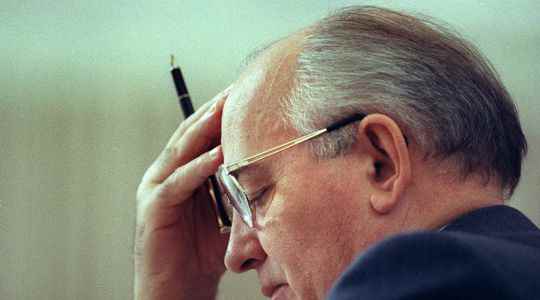“He was the only Soviet leader who gave us freedom. Gorbachev freed speech. With him, the Russians were finally able to say what they thought, after 70 years of terror. They were able to talk about the past, about the Great Patriotic War, the Gulag and other things we never talked about. He was the one who ended the exile of Sakharov and other imprisoned dissidents. At the time, I was often asked to translate writers’ conferences. I was fascinated by this freedom of expression that we had never known. Forbidden authors, such as the poet Ossip Mandelstam or the writer Isaac Babel, were finally able to be published. In the newspapers Ogonek and News from Moscowborn with Perestroika, we discovered, bewildered, in what state the economy was. We realized that a large part of our industrial capacities were devoted to armaments, such as those “machine tool” factories which actually produced tanks. Suddenly, we understood better why we lacked so many things on a daily basis…
Adored in the West, Gorbachev was, it is true, not much appreciated by popular Russian circles. The majority of people were against his reforms, because they turned their lives upside down. Then because they did not give the expected results. Gorbachev was surrounded by incompetent or ill-intentioned people. He had made a mistake: he thought that by dismissing the leaders of the Party at all levels and by appointing their number two in their place, things would change, except that the latter had precisely been chosen by their leader, according to a main criterion: they should not overshadow them. They were therefore not very good, lacked ambition. In fact, they were very wrong. Gorbachev, for example, attacked the scourge of alcoholism. Rather than restrict the consumption of hard liquor, such as vodka, his administration ordered the uprooting of vines across the country, causing a shortage of wine and general discontent. Very quickly, this measure turned against him.
Then, all the problems did not go up to him. For example, the abuses of the Russian army had been hidden from him during the demonstrations in Tbilisi (Georgia) in 1989, which had caused the death of 20 people, or, two years later, those in Vilnius (Lithuania).
“Love is not shameful”
On a more personal note, Gorbachev was the country’s first leader to appear in public with his wife, Raisa. They had known each other at the Lomonosov Faculty in Moscow, where they were both studying. Unlike his predecessors Stalin and Brezhnev, Gorbachev dared to show Russians that he was not ashamed to display his love, even when one is at the head of a country.
When he resigned in December 1991, I burst into tears. It will still take time to measure what he has brought to the country, especially when we see, in mirror, the current situation. Because today, in Russia, we see the return of the thirties and this fear from which Gorbachev freed us.
